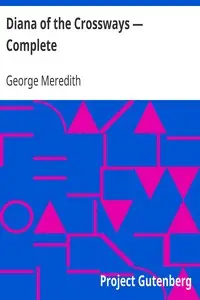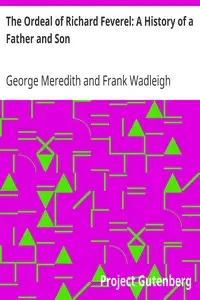"Evan Harrington — Volume 1" by George Meredith is a story set in a 19th-century seaside town, and it focuses on the aftermath of tailor Mr. Melchisedec Harrington's death. The once-celebrated but careless tailor leaves behind a mountain of debt, making things difficult for his family and, most importantly, his compassionate son, Evan. As the community reacts to Mr. Harrington's passing, the narrative sets the stage for a captivating exploration of class and expectation, which casts a shadow over the life of Evan and the family around him. Evan is faced with the challenge of settling his father's debts and also forging his own identity within a society grappling with the legacy of his father's trade. This all creates a compelling situation where the weight of family duty meets the desire for personal fulfillment.

Evan Harrington — Volume 1
By George Meredith
In a society struggling with class and reputation, a son must confront his father's financial and social legacy while trying to achieve his own dreams.
Summary
About the AuthorGeorge Meredith was an English novelist and poet of the Victorian era. At first, his focus was poetry, influenced by John Keats among others, but Meredith gradually established a reputation as a novelist. The Ordeal of Richard Feverel (1859) briefly scandalised Victorian literary circles. Of his later novels, the most enduring is The Egoist (1879), though in his lifetime his greatest success was Diana of the Crossways (1885). His novels were innovative in their attention to characters' psychology, and also portrayed social change. His style, in both poetry and prose, was noted for its syntactic complexity; Oscar Wilde likened it to "chaos illumined by brilliant flashes of lightning". Meredith was an encourager of other novelists, as well as an influence on them; among those to benefit were Robert Louis Stevenson and George Gissing. Meredith was nominated for the Nobel Prize in Literature seven times.
George Meredith was an English novelist and poet of the Victorian era. At first, his focus was poetry, influenced by John Keats among others, but Meredith gradually established a reputation as a novelist. The Ordeal of Richard Feverel (1859) briefly scandalised Victorian literary circles. Of his later novels, the most enduring is The Egoist (1879), though in his lifetime his greatest success was Diana of the Crossways (1885). His novels were innovative in their attention to characters' psychology, and also portrayed social change. His style, in both poetry and prose, was noted for its syntactic complexity; Oscar Wilde likened it to "chaos illumined by brilliant flashes of lightning". Meredith was an encourager of other novelists, as well as an influence on them; among those to benefit were Robert Louis Stevenson and George Gissing. Meredith was nominated for the Nobel Prize in Literature seven times.












